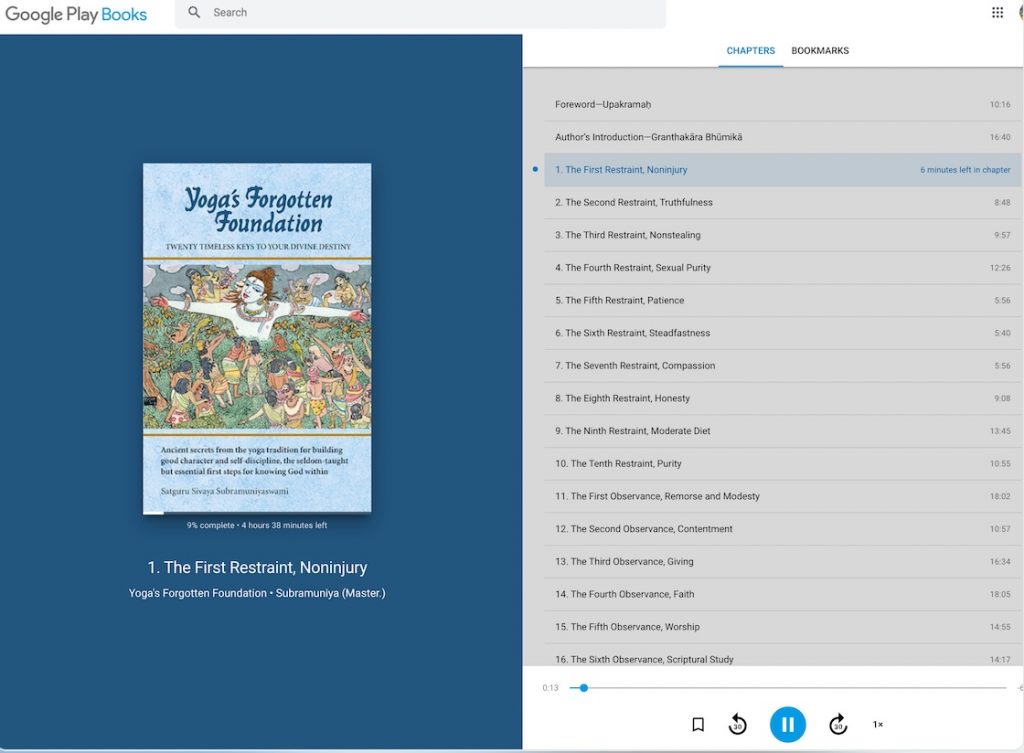Tirukural – Chapter 95
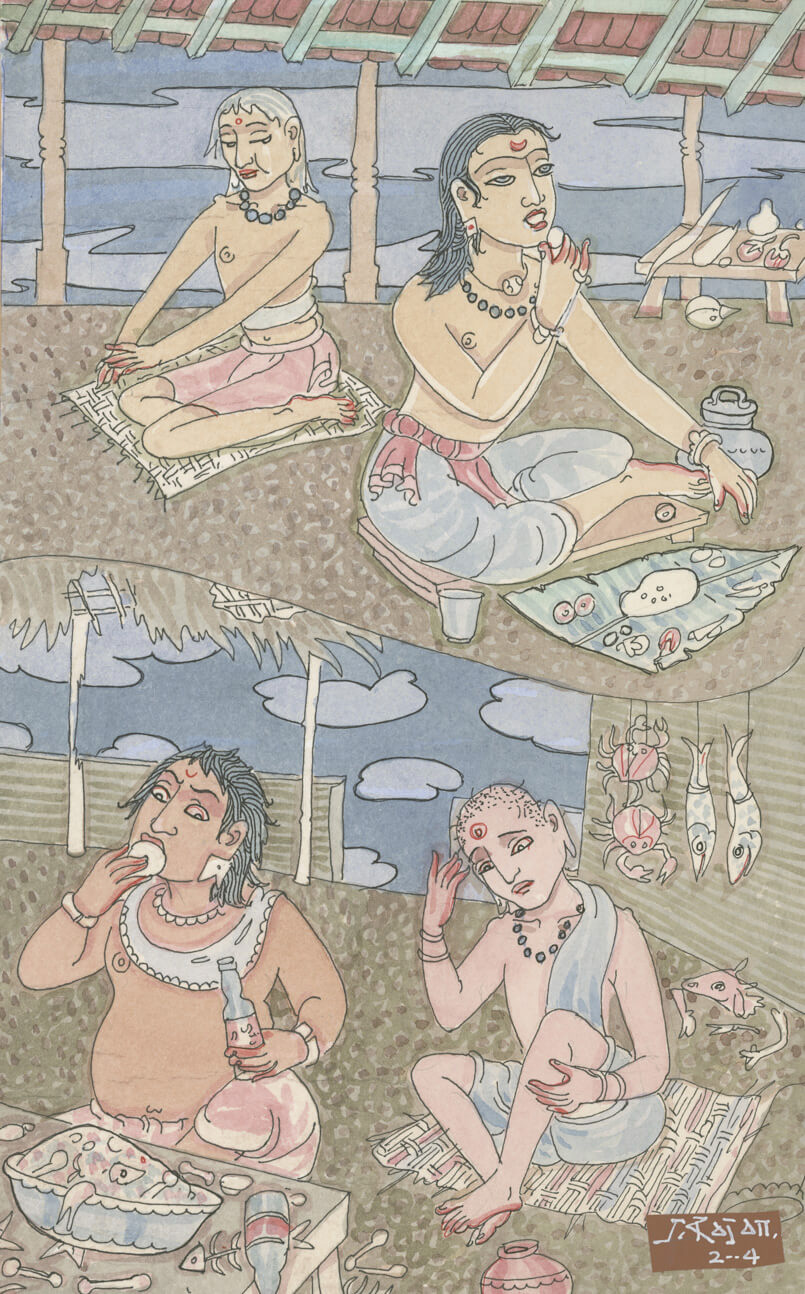
Chapter 95: Medicine

Verse 945
Above, a householder is taking his lunch on a banana leaf. He is eating wholesome rice and curry with lots of fresh vegetables. Behind him a family elder who has followed this diet his whole life is smiling and physically fit. Below, a less controlled man is eating and drinking over abundantly. His diet is alcohol, fish and meat. Nearby, an elder in his household, who is following this diet, is suffering from many ailments.
You can access the entire text, in Tamil and English here:
Weaver’s Wisdom
Verse 941
Disease is but deficiency or excess of three life forces,
defined by writers of scientific texts as air, fire and water.
Verse 942
The body requires no medicine if you eat
only after the food you have already eaten is digested.
Verse 943
Once digestion is complete, eat with moderation;
that is the way to prolong the life of the body.
Verse 944
Assured the last meal has digested and sensing a keen appetite,
savor only foods that are fully agreeable.
Verse 945
Life remains unharmed when one eats with restraint,
refraining from foods that have proven disagreeable.
Verse 946
The pleasures of health abide in the man who eats moderately.
The pains of disease dwell with him who eats excessively.
Verse 947
The thoughtless glutton who gorges himself beyond the limits
of his digestive fires will be consumed by limitless ills.
Verse 948
Diagnose the illness, trace its cause,
seek the appropriate remedy and apply it skillfully.
Verse 949
An accomplished doctor prescribes a remedy after considering
the patient’s nature, the disease’s nature and the time of year.
Verse 950
Medicine consists of a patient, a physician, a prescription
and a nurse–each of these having four parts.
Tirukural – Chapter 94
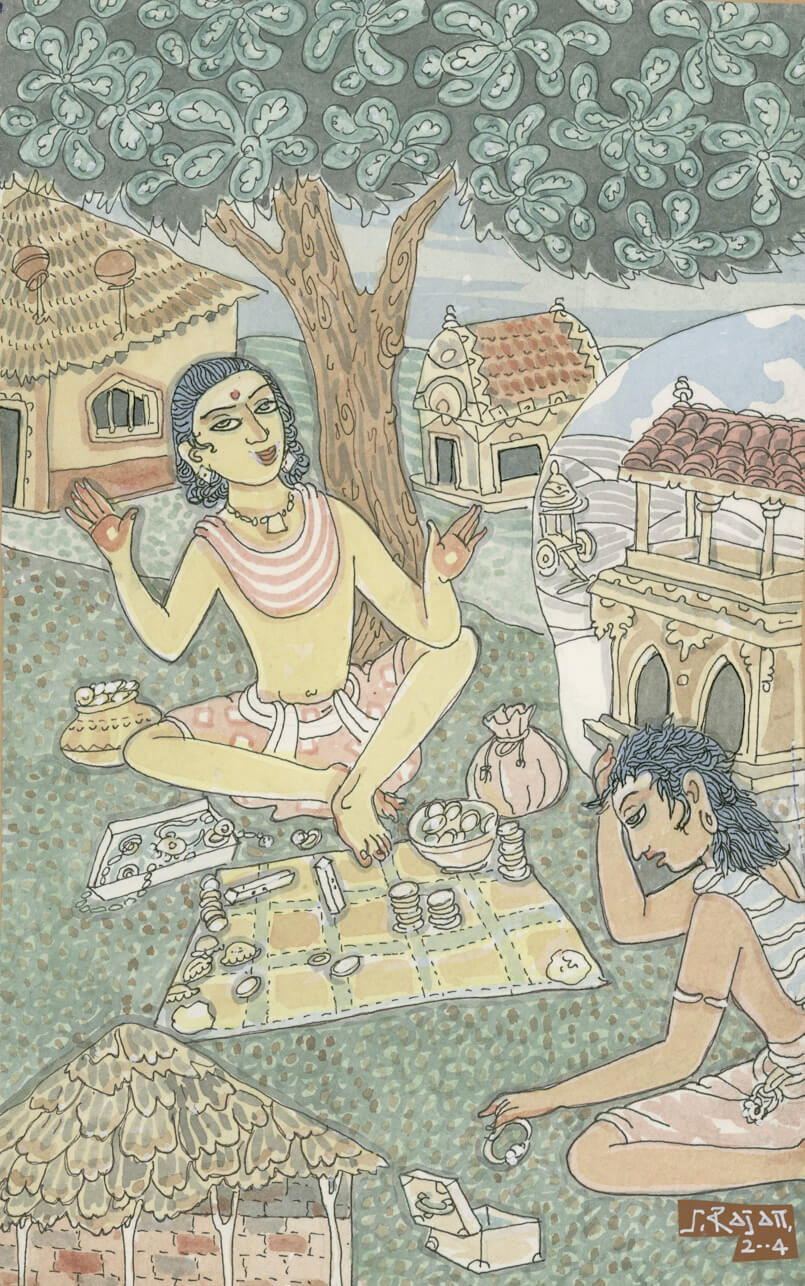
Chapter 94: Gambling

Verse 940
Under a tree two men have been gambling for hours. The winner, with his hands up, is celebrating and mocking the loser. The loser holds his head in disbelief that he has lost so much. However, he brings a bangle out of a treasure chest and offers to risk it along with his home and vehicles on the next roll of the dice.
You can access the entire text, in Tamil and English here:
Weaver’s Wisdom
Verse 931
Do not take to gambling, even if you can win,
for your wins will be like the baited hooks that fish swallow.
Verse 932
To win once, a gambler loses a hundred times.
What a way to procure happiness and prosperity!
Verse 933
Incessantly calling bets on rolling dice causes
a man’s rich reserves and potential revenues to run elsewhere.
Verse 934
Gambling brings on many miseries and erodes one’s good name.
Nothing else ends in such wretched poverty.
Verse 935
Desiring to win everything, those who love the dice,
the gambling hall and their lucky hand lose it all.
Verse 936
Gambling is Misfortune’s other name. Fools ensnared by her
will suffer an empty stomach and distressing sorrows.
Verse 937
Spending time in the gambling hall squanders
ancestral wealth and wastes personal worth.
Verse 938
Gambling will consume a man’s wealth and corrupt his honesty.
It will curtail his benevolence and increase his torment.
Verse 939
Those who take to gambling’s fickle gain forfeit these five:
raiments, riches, rations, renown and erudition.
Verse 940
The gambler’s passion increases with the losses incurred.
Even so does the soul’s craving for life grow with the griefs suffered.
Tirukural – Chapter 93
Chapter 93: Avoidance of Drunkenness
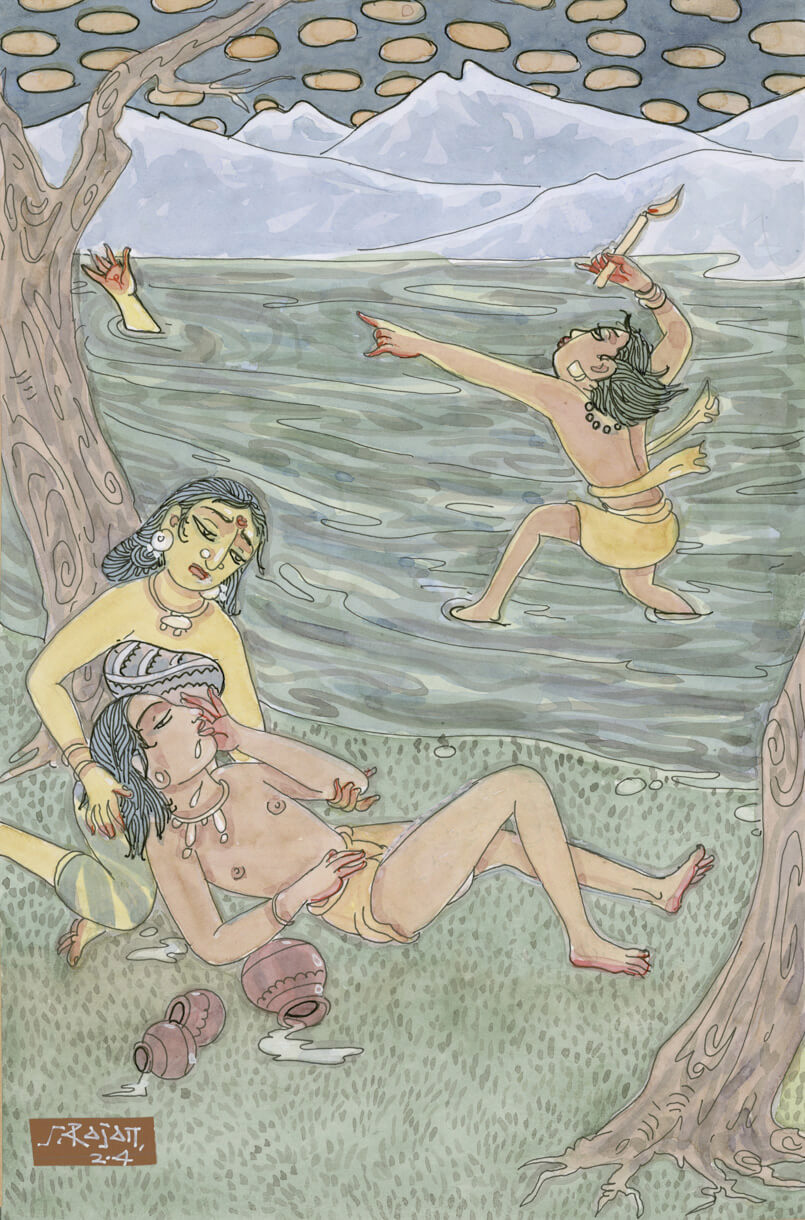
Verse 929
A grieving mother consoles her son who has drunk himself into a stupor. She is urging him, unsuccessfully, not to drink anymore. Meanwhile, her other son, being a bit foolish, rushes to save a drowning man, thinking that he can go underwater with a candle and it will illumine the man’s body.
You can access the entire text, in Tamil and English here:
Weaver’s Wisdom
Verse 921
Those who crave intoxicating drink each day
will never be feared and never find fame.
Verse 922
Do not drink liquor. If some wish to, let it be those
who have no wish for the esteem of exemplary men.
Verse 923
The sight of a drunken man’s revelry is unbearable
even to his own mother. How, then, must it appear to the wise?
Verse 924
The virtuous damsel called Decency will turn her back
on men who indulge in the vile vice called drunkenness.
Verse 925
Spending one’s wealth to purchase self-oblivion
results from being oblivious to proper conduct.
Verse 926
Those who always sleep are akin to the dead.
Those who constantly drink are like men who take poison.
Verse 927
The drooping eyes of those who secretly drink betray that secret,
evoking their neighbor’s relentless ridicule.
Verse 928
Stop denying, “I never drink,” for next time you drink,
your mind’s hidden deception will be betrayed then and there.
Verse 929
One may as well carry a candle under water to search for
a drowned man as use reason to sober a drunk drowned in drink.
Verse 930
Why can’t the drunkard who, when sober, sees another’s drunken
stupor realize the degrading shame of his own drunkenness?
Yoga’s Forgotten Foundation – The Audio Book!
Aum Namah Sivaya,
Please enjoy this audio book of Yoga’s Forgotten Foundation, which details the ten restrains and ten observances of Hindu religious life. The book is free. It was created in just a few hours using Google Play’s automated book transcription software, which has been improving rapidly in recent years. Let us know what you think!
Get it here
Woman Sage Chellachiamma
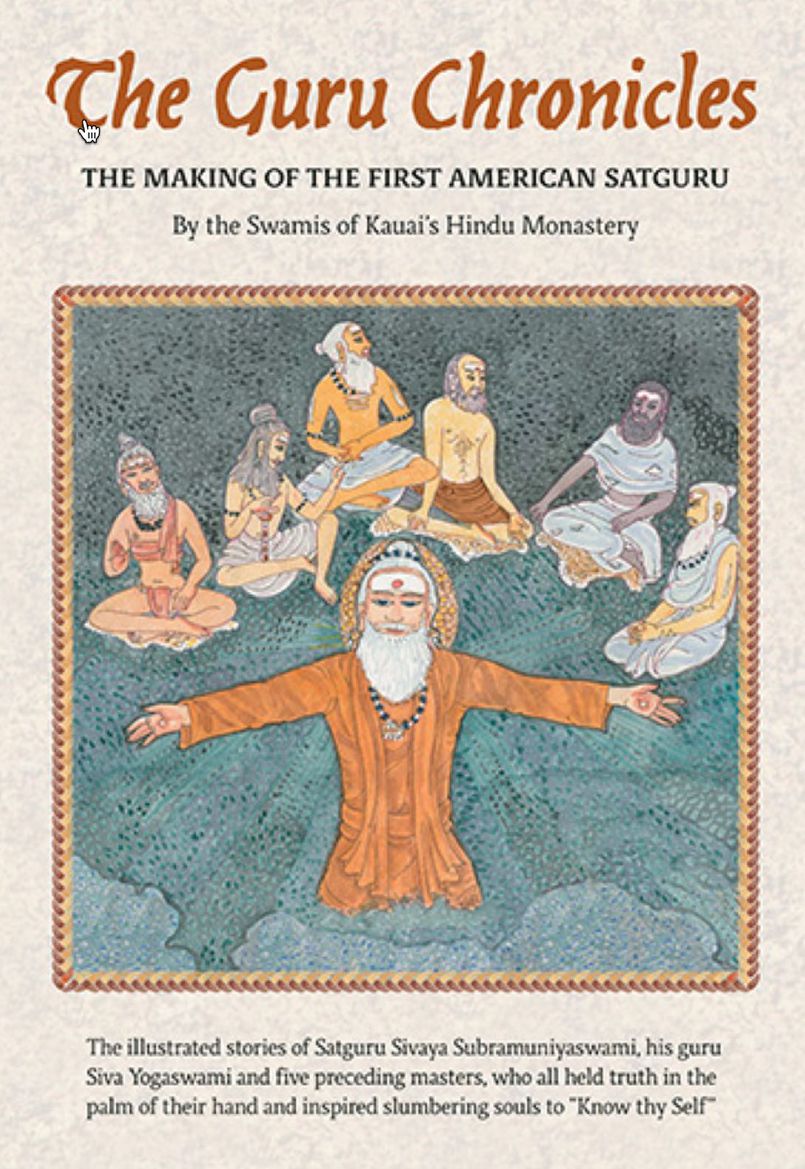
Today we bring you a story from The Guru Chronicles. It is part of a chapter on a mystical Tamil woman who was close to Yogaswami and for a time the primary spiritual preceptor in Jaffna, Sri Lanka.
One of Yogaswami's contemporaries was a saint named Chellachi Ammaiyar, whose home had become like an ashram. She was born in 1863, the same year Swami Vivekananda entered this world. Devout from early childhood, she worshiped at the temple as often as her parents would take her and learned the Puranic stories and the hymns of the Tamil saints. She lived in Chunnakam, a farming and market village about twelve kilometers outside Jaffna Town.
From the day her husband was cremated, her spiritual life was her only life. She followed a strict discipline for several years of sitting in meditation every time the village temple bell rang at puja time--reveling in the shakti as it drew her deep into Siva consciousness. One day her inner voice told her to stop doing that and to sing certain songs to Lord Ganesha. After singing them for several months, she received the message that she should now perform a daily puja to Siva, using a Lingam to represent the Supreme Absolute.
In time another inner message came: that her body would keep clean of itself, and she should not take a full bath again. She was not to go to the well and pour water over herself as she had done her whole life. She obeyed, never bathing again. Her gray hair, which knew no comb from that day, grew long and tangled. People who came to see her still remember the matted locks. Otherwise, she was perfectly clean and had a pleasant, radiant appearance.
At one point, directions came that she should prepare to go into the deepest samadhi, God Realization, direct encounter with the Divine. Instructions came to tell all members of the household that she would be sitting in meditation in the shrine room for a long time and should not be disturbed for any reason. She carefully explained this to each one individually. Then, entering her shrine room, Chellachi sat in perfect stillness, controlling her breathing for several days. Sometimes she would breathe very slowly and quietly; at other times her breathing would stop altogether. For several days she sat in that profound state.
After three days of observing that Chellachi seemed to be not breathing at all, a relative grew concerned that she had died. For hours and hours--concerned that the body, if dead, be properly taken care of so that no disembodied entity could take it over--she watched for any sign of life and saw none. Finally, she cautiously approached Chellachi Ammaiyar, opened her mouth and pulled out her tongue to see if it exhibited the tell-tale signs of death. It was a fateful mistake and a startling intrusion for the Siva-immersed saint. Without warning, her samadhi was shattered and awareness was brought crashing back into body consciousness. Several days passed, as her nerve system reeled from the horrendous shock.
The disturbance of that unusually deep state caused a severe reaction that lasted for the rest of her life. She became so sensitive to light that she could not even stand direct exposure to moonlight. The darkened veranda became her favorite place. If anyone approached who was not pure minded or had selfish motives, her body would heat up to the point of causing her pain. Close devotees were nervously cautious about whom they allowed in her presence.
Her ashram-like home radiated peace and stability. Yogaswami visited there frequently beginning around 1914. She was his elder by nine years, and he regarded her as a spiritual mentor. She addressed him as Thamby, meaning younger brother. Once she told a devotee that only by virtue of that shocking experience of having her samadhi interrupted did Yogaswami come to take her farther within than she could have gone without his grace.
Chellachi Ammaiyar was a gifted teacher. She spoke from her own experience about how important it is to follow the dictates of the divine voice within oneself and the divine laws that were perceived by the rishis. When people came to her who were having problems, she would always look to see where they were stepping outside the flow of life prescribed by the scriptures. She said that is how the ego is born and gains its strength. When you begin to twist what you perceive, what you know from within yourself is right, when you step off the path of virtue, then you build up the "I," and that "I" separates you from all of life and from that which is the very spring of life.
She spoke in a quiet, thin voice, as though she were too sensitive to hear herself speaking. But it had a piercing resonance, and everyone took note of all she said.
If you live life for its own sake, you have missed the purpose of living, for life is to be lived for the glory of God, and only God must be the center of life. Being obedient to the voice of the guru within yourself is more important than life itself.
Yogaswami often echoed those sagely words. "The spiritual path is a narrow bridge of hair over a river of fire!" was one of her well-known adages. It cautioned of the tenuous nature of the path and the abounding distractions that deter seekers. She taught that God will come in different forms, and that those forms change as you understand Him, love Him and follow His directions. "You will see more and more clearly, and finally you will be so pure that you will be only That."
During the first decade of his association with Chellachi Ammaiyar, Yogaswami was still hidden from public view. While in her company and in transcendental communication with Chellappaswami, he brought his teachings into articulation. Out of that all-important period of gestation, absorption and reflection came his emphasis on Sivathondu, "service to Siva," a potent term that embodied his compelling message to the Jaffna community and ultimately to all mankind: "Surrender totally in the pure act of service to God Siva. Be still. Know thy Self and serve the Lord who is All, in all." Two words would ultimately define his lofty public message: Sivathondu and Sivadhyana, service to and meditation upon Siva.
Toward the end of her life, Chellachi was so sensitive that she could only eat food that Yogaswami prepared. He would make the meal at his compound in the morning and carry it sixteen kilometers to her house each day. She was too weak to eat, so he fed her. Her earlier reactions to visitors grew far more intense, so much so that the inflammation caused by the presence of an impure visitor rendered her unable to breathe. Strict screening of visitors, once a cautionary rule, became an urgent necessity.
On January 27, 1929, Chellachi Ammaiyar attained mahasamadhi. Her family and some devotees planned to build a shrine and bury her body there, as is often done for enlightened beings, rather than cremate it. Yogaswami expressed his disapproval and emphatically said he would have nothing to do with it. The matter was settled when her son went to Yogaswami and agreed to cremate her body as Swami wished.
Her body was cremated on a sandalwood pyre. The arrangements were carried out by Yogaswami, Sir Vaithilingam Duraiswamy and Doctor Ramanathan. After Ammaiyar's passing, Swami, now age 57, was the sole spiritual refuge and guide for many of the Jaffna people. He remained the prominent spiritual light in that community for the next 35 years.
Tirukural – Chapter 92
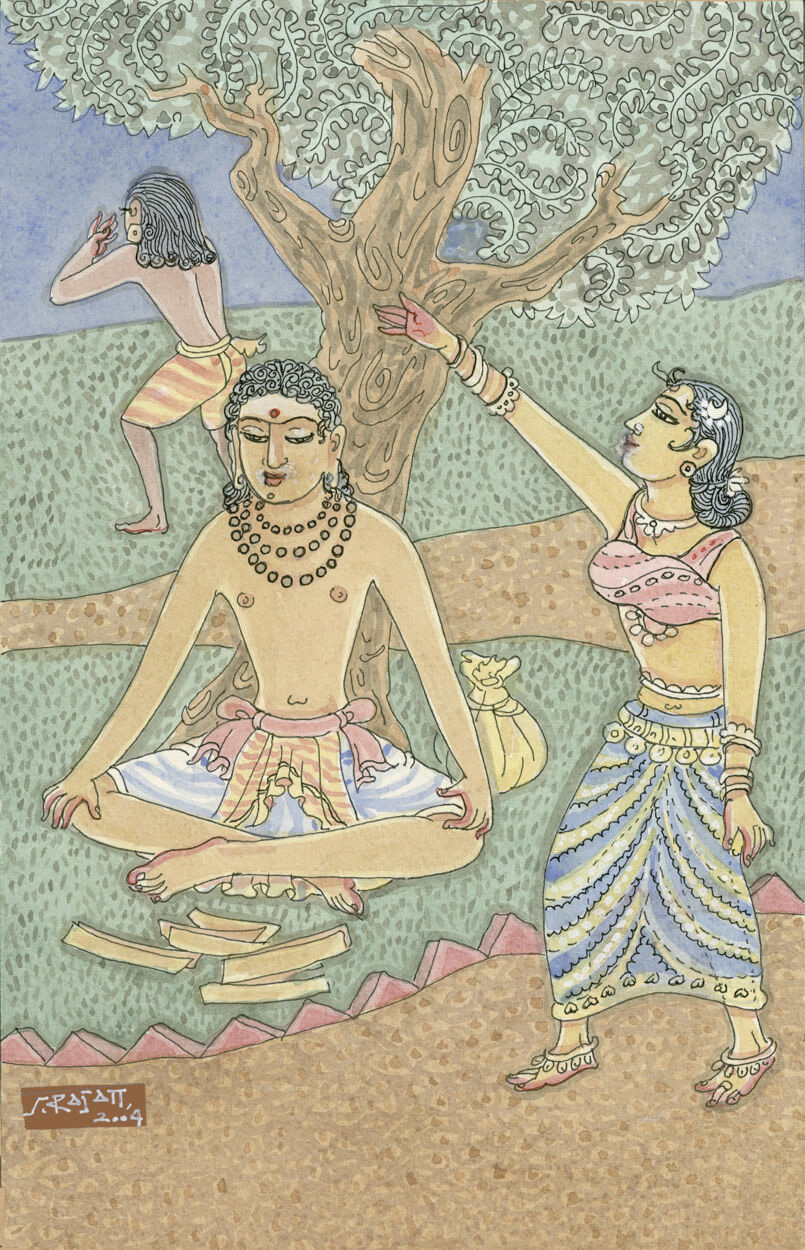
Chapter 92: Wanton Women

Verse 914
A man of some means, surrounded by wealth and scriptural texts, has retreated to a shady tree to contemplate spiritual matters. He does not see a beautiful woman who has approached him and is trying to get his attention. When he ignores her, the woman reaches out to another man.
You can access the entire text, in Tamil and English here:
Weaver's Wisdom
Verse 911
The sweet words of beautifully bangled women who desire
a man's wealth and not his love decree his fall into disgrace.
Verse 912
Weigh the worth and abandon the company of wanton women
who, weighing their profit, prattle about their virtues.
Verse 913
A mercenary woman pretends intimate embrace,
but in the darkened room, she caresses a stranger's carcass.
Verse 914
Men seeking spiritual treasures are too worldly wise
to touch tawdry women who treasure only material riches.
Verse 915
Men of innate good sense and acquired wisdom
never touch tramps who shamelessly share their beauty with all.
Verse 916
Desiring to maintain their jubilant goodness, men will not
embrace enticing women who proffer lewd charms to all.
Verse 917
Only men of unchaste mind will lie in the arms of women
whose hearts chase after other things as they embrace.
Verse 918
It is said that men devoid of discerning wisdom
succumb to a deceiving damsel's embrace as to a siren's song.
Verse 919
The soft arms of the elegantly bejeweled harlot
are a murky mire that engulfs wicked, stupid men.
Verse 920
Two-faced females, besotting brew and addictive dice
befriend the men whom fortune has forsaken.
Tirukural – Chapter 90
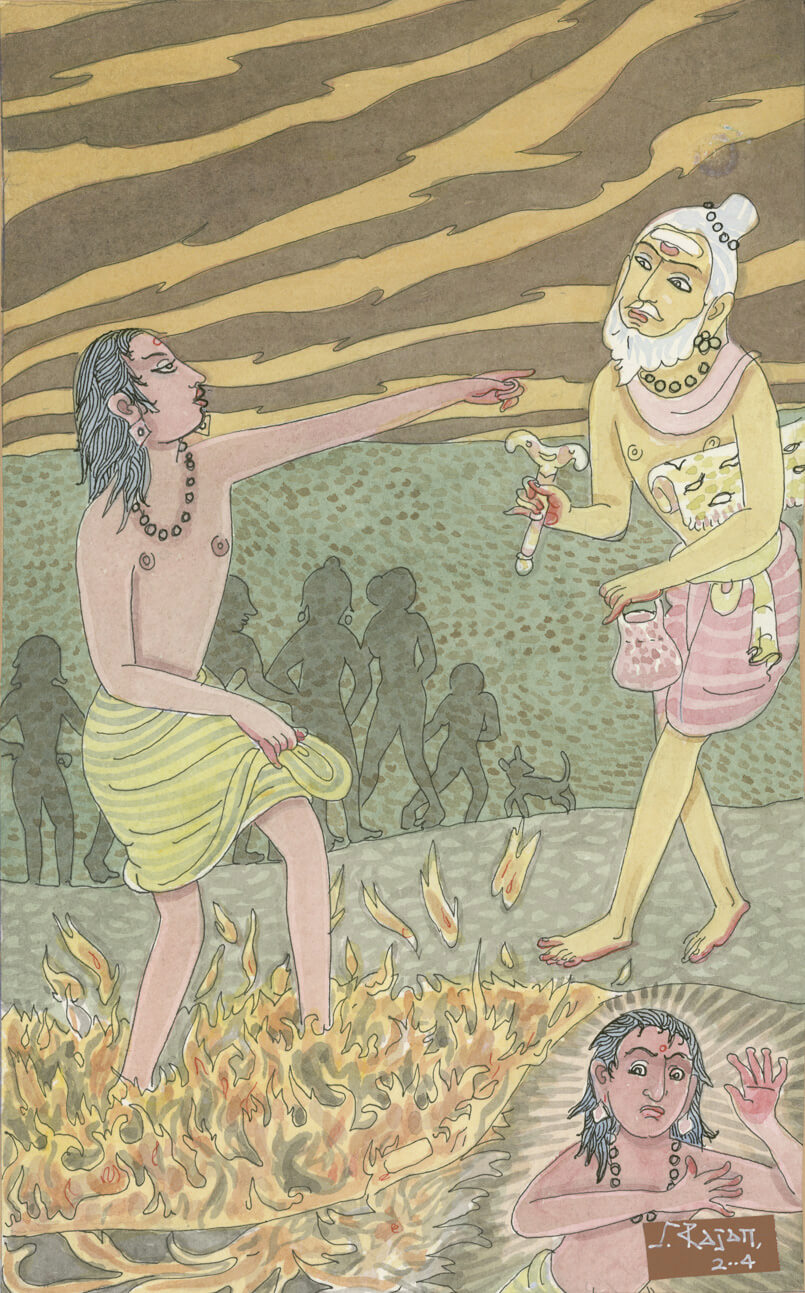
Chapter 90: Not Offending the Great

Verse 896
A man walks through a fire unscathed, despite its heat and burning flames. He encounters a holy man and scolds him. Immediately he is paralyzed in the picture below.
You can access the entire text, in Tamil and English here:
Weaver's Wisdom
Verse 891
Of all the ways to protect oneself, the foremost is this:
do not belittle the prowess of powerful men.
Verse 892
Disrespectful conduct toward great men will bring,
through those great men, unremitting miseries.
Verse 893
If you desire destruction, simply ignore the rules
and provoke those who, if they desire, can destroy you.
Verse 894
For the powerless to wreak harm upon the powerful
is to summon Death with a gesturing hand.
Verse 895
Once he incurs a fierce king's withering wrath,
one is doomed, wherever he wanders, whatever he does.
Verse 896
Though burned by a blazing fire, one may still survive;
but there is no survival for those who offend great men.
Verse 897
What is the use of a man's varied life and splendid wealth
if he reaps the wrath of great and righteous men?
Verse 898
If men of mountainous stature are meagerly esteemed,
others who seemed as enduring as earth will die, as will their kin.
Verse 899
The most kingly king will tumble from his throne and die,
should he unleash a towering sage's bridled temper.
Verse 900
Though he commands unrivaled powers of protection,
a king cannot survive the wrath of powerful ascetics.
Tirukural – Chapter 89
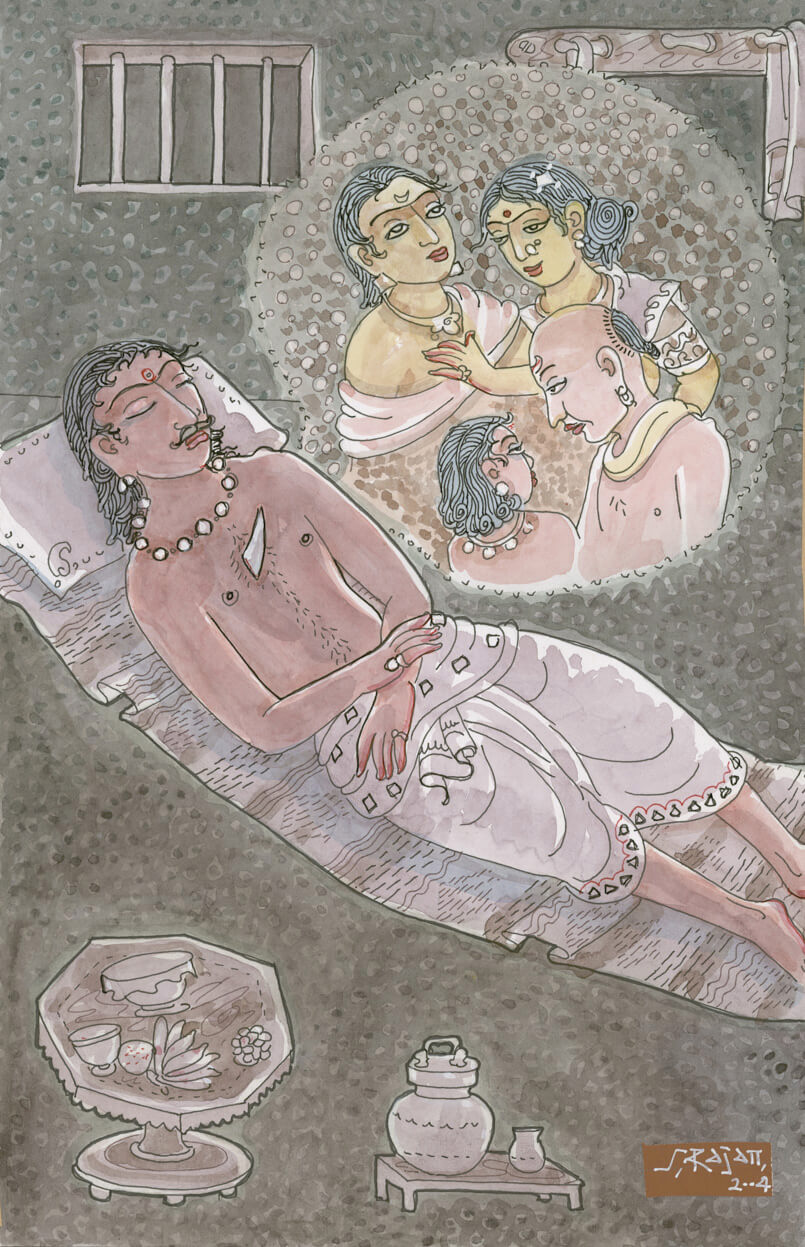
Chapter 89: Internal Enmity

Verse 885
A man who is miserable is sleeping and dreaming of his relatives, whom he hates and despises. The sleeping man's animosity will kill him, like the dagger that has penetrated his chest.
You can access the entire text, in Tamil and English here:
Weaver's Wisdom
Verse 881
Even shade and water are unpleasant if they breed disease.
So, too, may relatives be unpleasant if they cause harm.
Verse 882
Fear not the foe who is like a drawn sword;
rather fear the friendship of an enemy who poses as kin.
Verse 883
Dread hatred from within and defend yourself against it.
In calamitous times it will cut deeper than a potter's knife.
Verse 884
Hidden hatreds may lurk only in the mind,
yet among kin they can manifest many miseries.
Verse 885
Hate hidden in a kinsman's heart will cause
many miseries, and more--it will kill a man.
Verse 886
When hatred arises, dissension destroys unity,
and men fall inescapably toward ever-ready death.
Verse 887
A house that harbors hatred will never be a united whole,
though, like a vessel and its lid, it may appear to be one.
Verse 888
As iron is worn away by frequent filing,
a family's strength is eroded by incessant inner frictions.
Verse 889
Internal dissension may seem as small as a split sesame seed,
yet there is enough power in it to destroy.
Verse 890
Living with those who cannot dwell in harmony
is like living in a hut with a deadly cobra.
Tirukural – Chapter 88
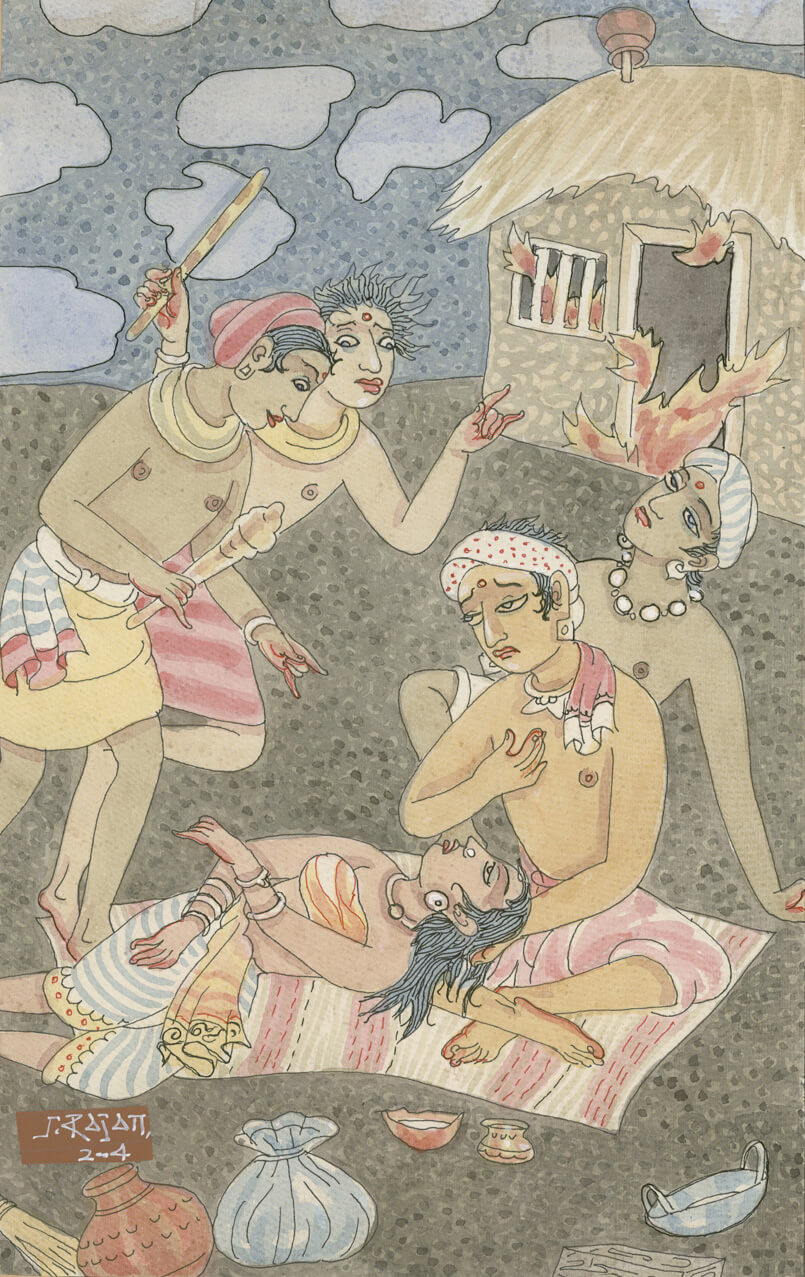
Chapter 88: Understanding the Nature of Enmity

Verse 876
A householder is sitting on the ground holding the head of his dying wife. Behind him, his house is burning and in front of him he is being threatened by two mischievous men with clubs. Despite all these troubles, his close friend remains in support, calmly sitting near.
You can access the entire text, in Tamil and English here:
Weaver's Wisdom
Verse 871
So accursed is the thing called hatred that one
should never wish for it--even in jest.
Verse 872
It is bad enough to incur the enmity of those who live by the bow,
but never provoke the hatred of those who sow and reap with words.
Verse 873
One man who, all by himself, arouses hatred in many
is crazier than any lunatic.
Verse 874
The world abides beneath the greatness
of noble-natured rulers who befriend even their enemies.
Verse 875
Finding that he faces two foes and has no allies,
a lone man lures one to side with him.
Verse 876
When distress dawns, neither draw near nor depart from
new friends and foes--rather, leave them alone.
Verse 877
Never tell your troubles to those who cannot comprehend them,
nor expose your weaknesses to your enemies.
Verse 878
Engineer a plan, execute that plan well and ensure
your security--thus is the joy of rivals forever ruined.
Verse 879
Chop down a thorny tree while it is young.
Left to grow mature, it will one day cut the cutter's hand.
Verse 880
Those who fail to quell a hostile rival's pride
will be blown away by the mere fact that he still breathes.
Tirukural – Chapter 87
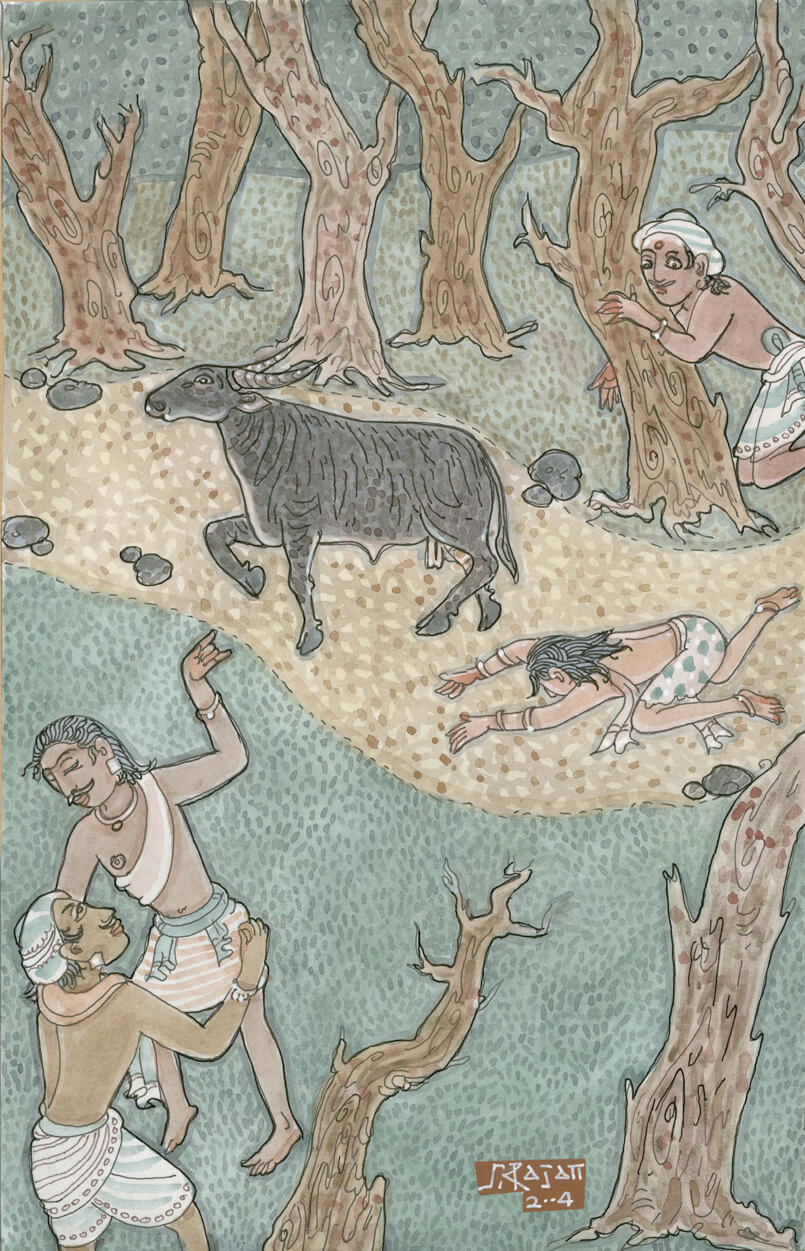
Chapter 87: The Merits of Enmity

Verse 863
Two villagers in the foreground observe two responses to a raging buffalo. A young boy, ignorant and unattentive, has been trampled by the beast since he did not leave the road. A wiser traveler has found refuge behind a tree and avoided harm.
You can access the entire text, in Tamil and English here:
Weaver's Wisdom
Verse 861
Rein in antagonism against the strong,
but unleash animosity against feeble adversaries.
Verse 862
How can an unloving man, with neither powerful allies
nor the strength to stand alone, overcome mighty enemies?
Verse 863
He who is fearful, ignorant, unfriendly and uncharitable
proves an easy prey to his enemies.
Verse 864
Letting go of his secrets but not his antipathy,
a man becomes easy prey to anyone, anywhere, anytime.
Verse 865
Without character, conscience, piety and propriety,
a man may yet be delightful--to his enemies!
Verse 866
Even hatred can be a welcome thing, when it comes from
scoundrels seized by blind rage and indulgent lust.
Verse 867
Some men undertake a task, then undermine it unawares.
Acquire their hatred--indeed, pay good money for it.
Verse 868
If a man has no virtues and many vices, he will surely have
no allies, and this will be his enemies' surest advantage.
Verse 869
Finding that his foe is ignorant and afraid to fight,
the attacker's cheerfulness cannot forsake him.
Verse 870
Fame will flee the grasp of one who fails to grasp
the wealth of an enemy who is angry and unlearned.
From Our Gurus' Teachings
Archives are now available through 2001. Light colored days have no posts. 1998-2001 coming later.

